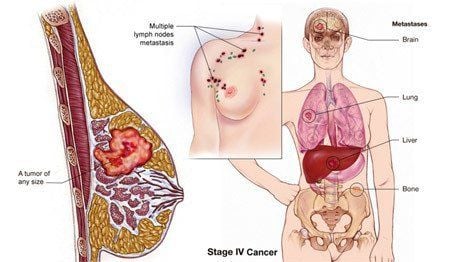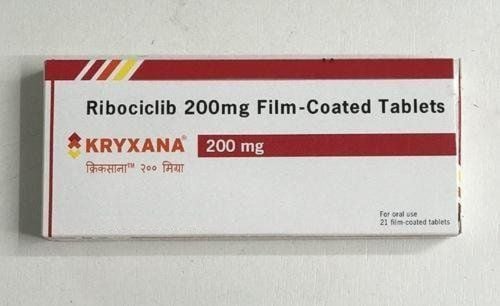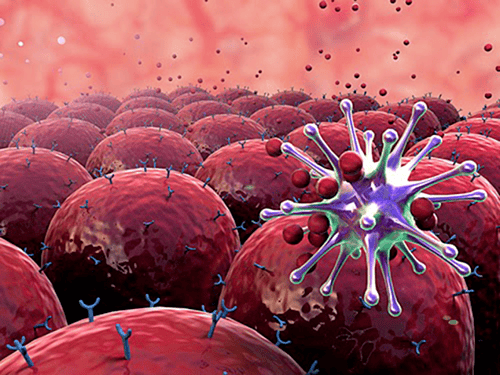This is an automatically translated article.
Stage 4 breast cancer has spread outside the breast and nearby lymph nodes to other parts of the body. When breast cancer metastasizes, it usually reaches mainly organs such as the bones, liver and lungs, and sometimes the brain. Treatment for stage 4 breast cancer is mainly aimed at slowing tumor growth and increasing survival.1. What is stage 4 breast cancer?
Stage 4 breast cancer is also known as advanced breast cancer or metastatic breast cancer. In this stage, cancer that develops in the breast has spread to other areas of the body. Breast cancer cells may have traveled through the lymphatic system to the lungs, liver, bones, brain, or other organs.Stage 4 is considered the most serious and life-threatening stage of breast cancer patients. Usually, stage 4 breast cancer develops long after a patient is first diagnosed with the cancer. In rare cases, breast cancer may have progressed to stage 4 by the time of first diagnosis.
Coping with stage 4 breast cancer is really a big challenge for both patients and doctors. However, following a treatment plan recommended by your therapist and implementing healthy lifestyle habits can help improve the outcome of your cancer treatment. In addition, it also helps to significantly increase the life expectancy and quality of life of patients with advanced breast cancer.
Trắc nghiệm: Những lầm tưởng và sự thật về ung thư vú
Ung thư vú có tỷ lệ tử vong cao nhất ở nữ giới khiến họ rất lo sợ bản thân mắc phải căn bệnh này. Tuy nhiên, không ít chị em có những hiểu biết thái quá về ung thư vú. Thử sức cùng bài trắc nghiệm sau sẽ giúp bạn loại bỏ được những nghi ngờ không đúng về căn bệnh này.
Bài dịch từ: webmd.com
2. Survival rate of patients with stage 4 breast cancer
Many people wonder how long they can live with stage 4 breast cancer? According to the National Cancer Institute, an estimated 27% of patients live at least 5 years after being diagnosed with stage 4 breast cancer.Many factors can affect the life expectancy and quality of life of breast cancer patients. On the other hand, different types of breast cancer are also active and have different degrees of progression. Some types of breast cancer are more aggressive than others, and some have fewer treatment options. For these reasons, the type of breast cancer can significantly affect a patient's outlook for survival.
Survival rates are also related to the extent and location of metastases of stage 4 breast cancer. In other words, your life expectancy will be longer if breast cancer has only spread to the bones instead of the lungs. In addition, patients with stage 4 breast cancer also need to be treated as soon as possible with methods such as chemotherapy, hormone therapy or surgery to help improve the outlook for cancer survival. In addition, treatment for stage 4 breast cancer also includes healthy lifestyle changes.

3. Treatment options for stage 4 . breast cancer
In stage 4, breast cancer has spread to other organs in the patient's body, mainly in the bones, lungs, brain and liver. Treatments for stage 4 breast cancer alone, surgery or radiation alone will often not be enough to significantly improve the disease.Although we cannot completely cure stage 4 breast cancer, with the right treatment methods can help shrink and slow the growth of cancer, thereby helping patients feel better. feel better and live longer.
Here are the common treatment options for stage 4 breast cancer:
3.1. Chemotherapy Chemotherapy for stage 4 breast cancer is considered the main treatment for patients when the cancer has progressed to this stage. Chemotherapy can slow cancer growth and is often used in combination with hormone therapy to increase the effectiveness of breast cancer treatment.
Patients with stage 4 breast cancer can receive chemotherapy in a variety of ways, including taking drugs/liquids that are given into a vein. Depending on the type of treatment, it may be done in cycles to give the patient's body time to rest after each course of chemotherapy.
3.2. Hormone therapy Hormone therapy can be highly effective treatment for women with breast cancer that is sensitive to hormone receptors that stimulate cancer growth. Medications commonly used in hormone therapy include tamoxifen for all women and an aromatase inhibitor (such as exemestane (Aromasin), anastrozole (Arimidex), or letrozole (Femara)) for postmenopausal women. In addition, toremifene (Fareston) and fulvestrant (Faslodex) are also other drugs that block hormone receptors. These drugs are sometimes used to treat stage 4 breast cancer. Women who haven't reached menopause can have their ovaries removed to stop them from making the hormones that help develop breast cancer.
3.3. Targeted therapy Targeted therapy is a newer stage 4 breast cancer treatment. It is estimated that about 20% of women with breast cancer have too much HER2 protein, which causes the cancer to spread rapidly in the body. Women with HER2-positive metastatic breast cancer are often given trastuzumab (Herceptin) to help block a protein that causes cancer cells to grow.
Other targeted therapies for HER2-positive breast cancer patients may include:
Ado-trastuzumab emtansine (Kadcyla) Lapatinib (Tykerb) Fam-trastuzumab deruxtecan-nxki (Enhertu) Margetuximab (Margenza) Pertuzumab ( Perjeta) Neratinib (Nerlynx) Abemaciclib (Verzenio) Ribociclib (Kisqali) Palbociclib (Ibrance) In addition, a PARP inhibitor can also be given to HER2-negative women with BRCA-mutant breast cancer, including talazoparib (Talzenna) and olaparib (Lynparza).
In women with hormone receptor-negative and HER2-negative breast cancer, immunotherapy drugs that stimulate the immune system to find and destroy cancer cells, including atezolizumab (Tecentriq) ). Sometimes this medicine can be used in combination with the chemotherapy drug paclitaxel (Abraxane).
3.4. Surgery and radiation therapy Radiation therapy and surgery may be used to treat stage 4 breast cancer in certain cases. These treatments can help control pain and other symptoms in areas where breast cancer has spread.

4. Diet and the treatment of stage 4 breast cancer
Having stage 4 breast cancer can lead to conditions such as weight gain or weight loss. To prevent this, doctors often encourage patients with metastatic breast cancer to make dietary changes.Women with stage 4 breast cancer may gain weight for a number of reasons, including financial stress, fluid retention due to chemotherapy, stress in relationships, low energy or use steroids. A new study shows that breast cancer survivors gain weight faster than women who have never had cancer. In addition, women with estrogen receptor-negative tumors who received chemotherapy in combination with statins also had a significantly higher rate of weight gain than those with breast cancer who did not take statins. Some women may also experience weight gain from using hormone therapies such as tamoxifen.
However, not all women with stage 4 cancer experience weight gain, as some also experience significant weight loss caused by anorexia. In addition to weight gain/loss, stage 4 breast cancer treatments and their use can cause other side effects such as diarrhea, nausea, or decreased appetite.
4.1. Change your diet Even if you have gained weight from stage 4 breast cancer, you should not follow a strict diet. Instead, try to focus on choosing healthy, nutrient-dense foods to support the growth of immune cells.
Here are some tips to help patients with stage 4 breast cancer develop a healthy eating plan for themselves:
Eat several small meals a day to help reduce nausea and maintain energy. quantity of the body. Choose lean protein sources to support tissue and cell repair, including chicken, low-fat dairy, eggs, beans, soy products, and nuts. Eat a variety of fruits and vegetables each day to provide antioxidants, which help boost immunity. Stay hydrated by drinking plenty of fluids each day Eat high-calorie foods on days when you feel hungry, such as milkshakes, smoothies, nut butters, crunchy biscuits. 4.2. Nutrition helps reduce nausea for patients with stage 4 breast cancer Stage 4 breast cancer treatments can cause unpleasant side effects for patients, which include feeling nauseous. Here are some nutritional steps to help you maintain your energy levels and reduce nausea, including:
Eat foods/drinks containing ginger, such as ginger tea Consume foods that are reheated instead of cooked because they produce less of a nauseating odor Drinking lemon water helps reduce nausea Choose bland, easily digestible foods such as toast, applesauce, crackers and bananas. Limit foods that create flavors that are too stimulating for the taste buds, such as sweets, greasy foods, and foods that are too hot. Even if you lose your appetite, you should still try to stay hydrated until you feel like eating again.

Vinmec gathers a team of well-trained specialists in Oncology - radiation therapy. , rich in expertise and experience; system of modern equipment, meeting international standards; Professional service quality, high efficiency in diagnosis and treatment.
Please dial HOTLINE for more information or register for an appointment HERE. Download MyVinmec app to make appointments faster and to manage your bookings easily.
References: cancer.org, webmd.com












